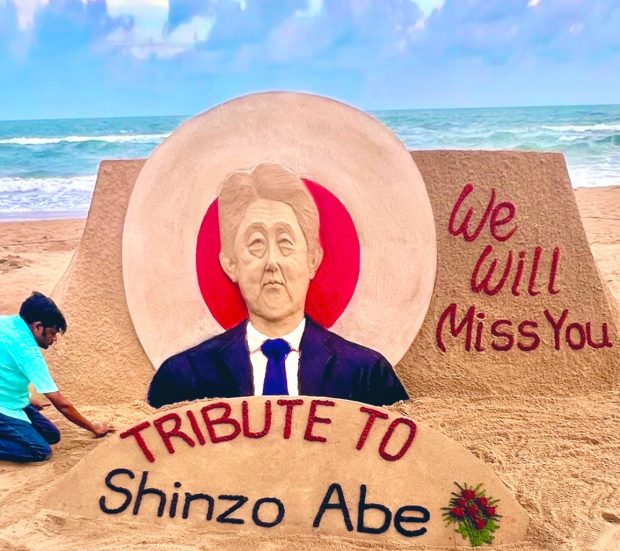Shinzo Abe’s murder raises troubling questions

Sand art at Puri beach in India with the message “We will miss you” in tribute to Shinzo Abe.
(Sudarsan Pattnaik – Twitter)
By Ivan Lim
Former AJA President, Contributor to AsiaN
SINGAPORE: The tragic untimely death of Shinzo Abe at the hands of an assassin has raised some troubling questions.
One: Is there a shortcoming that in a robust democracy like Japan citizens still have to resort toviolence to resolve their grievances against politicians?
The former Japanese prime minister,67, was gunned down in broad daylight while speaking during a street rally in the city of Nara on Saturday (July 9) to support a Liberal Democracy Party (LDP) candidate in Upper House elections. His killer, Tetsuya Yamagami,41, a former serviceman in the Maritime Self-Defence Force, told police he had a grievance against Mr Abe for his affiliation to a religious organisation that siphoned off his mother’s savings through membership fees and donations.
Japanese politicians have condemned the violence as an affront to democracy. In a move to uphold democracy, the Asian nation proceeded with Sunday’s elections.
Two, will Mr Abe’s political legacies survive his passing? To start with, Mr Abe’s act is hard to follow for the LDP leaders.
A “princeling”, he came from a long line of prominent politicians. His maternal grandfather was Prime Minister Nobesuke Kishi(1957-1960), who survived an attempt on his life in1960; his great-uncle was Prime Minister Eisuke Sato(1964-1976) and his father, Shintaro Abe, was a former Foreign Minister.
His unmatched political heritage gave him influence and prestige in the Liberal Democratic Party where he rose, at 52, to become Japan’s youngest Prime Minister. He served from 2006 to 2007 and after a break due to illness, from 2012 to 2020, to become the longest-serving post-war prime minister. Even after leaving office, he remained a king-maker in his party, earning the moniker of Shadow Shogun.
A charismatic leader in his own right, he exuded confidence and reached out to US presidents and other world leaders with whom his personal diplomacy helped forge Japan’s new assertive foreign policy.
Thanks to a novel and outstanding approach to global issues and international partnerships, Mr Abe was able to build robust bridges with world leaders, and especially strong bonds with Arab leaders. He visited several Arab countries, notably Saudi Arabia, Egypt and Jordan, where he agreed with their leaders to boost efforts that would promote stability and peace in the region.
The third-generation politician was credited for returning Japan to stability after a seeing a period of revolving-door prime ministers.
To jump-start Japan’s stagnant economy in 2012, Mr Abe launched a stimulus package dubbed Abenomics.This was made up of the three arrows: monetary easing, high state spending and promotion of private investments. His policies put Japan back on a much-needed growth track.
He was also instrumental in establishing the Comprehensive and Progressive PartnershipAgreement after US president Donald Trump pulled his country out of the Trans-Pacific Partnership.
In pursuing his vision of Pacific-Indo security, the late Japanese statesman played a key role in forging the Quadrilateral Security Dialogue (Quad) that groups Japan with the US, Australia and India. That did not endear him to Beijing which saw the Quad as directed against China.
However, Mr Abe was “not reflexively anti-China but saw deep value in hedging against Beijing’s assertive instincts”, according to The Straits Times associate editor Ravi Velloo. He noted that in 2019, he had sent Mr Toshihiro Nikai, the No. 2 man in the ruling LDP, to Beijing with a conciliatory letter to Chinese President Xi Jinping.
Nevertheless, Beijing viewed warily Tokyo’s foreign policy of aligning with US military strategy of containment against a rising China.
Mr Abe’s push for reviving Japan’s military power proved to be controversial.
The Straits Times analyst also described the Japanese leader’s drive “to become a ‘normal’ state, with a fully functioning military and amending the crucial Article of the post-war Constitution, was thus viewed with dismay in significant sections of Japan.”
Legacy-wise, Mr Velloo concluded it would a decade or two perhaps to “get the full measure of Mr Abe and his impact on Japan. However, the late nationalistic Japanese leader’s unfulfilled pledge to revise the war-renouncing Article 9 of the post-war Constitution by 2020 might be revived following his assassination.
As Tobias Harris, author of The Iconoclast: Shinzo Abe And the New Japan, said: “At the time of his death, it appeared that the Japanese people might finally be coming around to Mr Abe’s vision. Thanks in part to Russia’s war in Ukraine, a robust majority appeared to support higher levels of military spending.”
In his article in The Straits Times, Mr Harris, cited dovish Prime Minister Fumio Kishida as signalling he would back higher military spending to boost the capabilities of Japan’s Self-Defence Force.
(This) is “a sign of just how much Mr Abe’s Liberal Democratic Party came to share his vision during his 30-year career,”said the senior fellow at the Centre for American Progress.
And Mr Kishida’s hand is strengthened by the LDP winning a majority in Sunday’s upper house elections, securing 63 out of125 seats up for grabs, an outcome probably linked to the Abe assassination factor. The LDP and its ally, Komeito party, now command 76 seats in the 248-strong upper chamber of Parliament.

























































